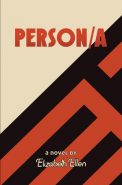
Book Review: Person/a by Elizabeth Ellen
Reviewed by Charlotte Kupsh

Person/a
A novel by Elizabeth Ellen
Short Flight/Long Drive Books, February 2017
$19.00; 616 pp.
ISBN-13: 978-0-9896950-6-0
In her dizzying, metatextual debut novel, Elizabeth Ellen recounts a romantic obsession while reflecting on being a woman writing about obsession. The book begins with the narrator (also named Elizabeth Ellen) plunging into memories of a short-lived relationship with a celebrity named Ian. The relationship is “ending almost from the beginning,” complicated by the narrator’s existing boyfriend, her child, and Ian’s unstable lifestyle. But the brevity of the relationship has no bearing on the voracity of her feelings; the narrator tells the story, and then, as if she cannot pull herself away, immediately retells it, adding addendums and recanting previous impressions. With each retelling, the novel gradually shifts from romantic obsession to the act of writing about obsession. The book becomes about Elizabeth Ellen, author and narrator, person and persona, deciding how to write the novel the reader holds.
Ellen’s descriptions of obsession read like confessions that, through their universality, will feel familiar to readers. In agonizing detail, the narrator lingers on every text message and missed opportunity. Even the act of retelling is painful: “This sentence and the image it produces wounds me in a way no other sentence I will ever write will,” she writes, and the reader feels her exhaustion. Her deepening anxiety is evidenced by the prose: in long sentences with repeated words and phrases, the reader experiences the claustrophobic racing of the narrator’s mind. The reader understands the narrator’s mental state even more viscerally in the book’s organization, which is a blend of short paragraphs, text messages, emails, and quotations. The narrative moves between these pieces like a frantic mind, switching to a new idea or text based on emotion rather than chronology.
PERSON/A is about obsession, but also about a woman aware that readers struggle to distinguish between invention and autobiography. Gradually, the reader realizes that the narrator shares only highly edited, partially-true fragments. This breach of trust between reader and narrator goes both ways; the narrator continually rebukes readers for judging and assuming they understand her. Ellen forces readers to rethink their perspectives—the narrator is only a persona, and just as her characters are “method actors,” the narrator “is not me either.”
PERSON/A is a fresh take on familiar feelings of loss and obsession. Its shifting narrative challenges readers to face their own preconceived ideas about the distance between woman and narrator, person and persona. The novel feels like half autobiography, half fiction, and both halves will leave readers stunned.
Charlotte Kupsh is a graduate student in writing at the University of Wisconsin-Eau Claire. You can read her other reviews and short fiction in Pleiades and The Madison Review.

Leave a Reply